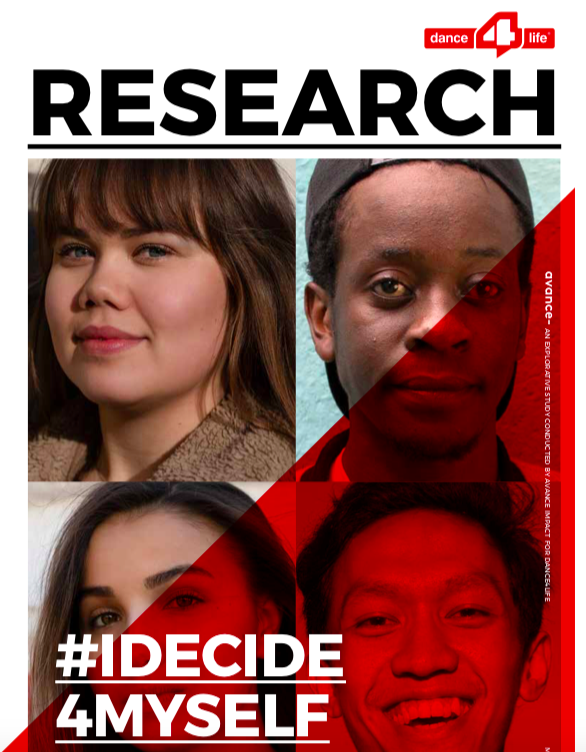#IDECIDE4MYSELF -Research Report
This explorative and quantitative study, commissioned by Dance4Life and executed by Avance Impact, explores the connection between empowerment, relationships and sexuality among nearly 2,500 young people in four countries from different continents.
Unprotected sex is the greatest health risk facing young people worldwide. Many young people live in a society in which sex and sexuality continue to be surrounded by taboos and stigmas. In addition, the issue of seriously inappropriate or aggressive sexual behaviour is becoming ever more visible in the Netherlands and elsewhere. Dance4Life believes in encouraging openness about all aspects of sexuality and wishes to gain a better understanding how personal empowerment, self-confidence, and the social and emotional skills that enable young people to make responsible choices about all aspects of their lives, are interconnected.
Dance4Life asked Avance Impact to do an explorative study on the concept of empowerment – a key foundation on which our work is built.
The research questions were: what does empowerment mean to you (I), do you feel empowered yourself (II), and which aspects of empowerment help you in making choices in relationships and regarding sexuality issues (III)? Between October to November 2018, the researchers surveyed 2,434 young (age between 15 and 21 years old) people about the concept of empowerment: 574 from The Netherlands, 602 from Kenya, 667 from Russia and 591 from Indonesia.
The results of this explorative study give a unique first insight in how young people think about empowerment and in what they find important in making (sexual) choices.
MAIN CONCLUSIONS
The term empowerment is not commonly known by young people Empowerment – described as ‘being able to decide for yourself to realize your dreams and ambitions’ – is very important to young people in all countries. Results however show that most young people do not know the term empowerment. It is important for the development sector and programs working on empowerment, to use language that is understandable for young people targeted by these programs. For example, using a local term or description of empowerment that speaks to young people.
Empowered young people are able to make healthier choices – Highly empowered young people more easily recognise and value strategies for making responsible sexual and relational choices. Therefore, it can be easier for them to make positive and healthy choices. This supports the principle of why working on empowerment can eventually lead to a healthy and responsible choices on life, sexual and relations choices. This study therefore also underpins the vision behind Dance4Life’s Empowerment Model, that is based on motivating young people to believe in their own potential and strength to make their own choices. Dance4Life views this study as a first indication for the foundation of the vision behind Dance4Life’s Empowerment Model, that is based on motivating young people to believe in their own potential and strength to make their own choices.
Contextualisation of SRHR programs and campaigns is key – The study provides useful insights and guidelines for developing and implementing Sexual and Reproductive Health & Rights programs and campaigns. It shows the differences in how young people from four diverse cultural backgrounds estimate aspects of empowerment. When developing and implementing SRHR programs and campaigns, the differences in how young people estimate aspects of empowerment should be kept in mind. Adjusting the focus of both programs and campaigns to the target group and cultural context according to the specific findings in this study, could increase their impact.
